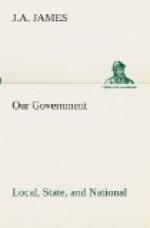15. How many electors were there from your State? For whom did they vote? How is this majority in your State to be accounted for? Rev. of R’s, 22: 673-674, 655-658, 664.
16. Would successful governors make good candidates for President? In what particulars do the offices resemble each other? Would you favor making the governor of your State President? Wilson, Congressional Government, 253, 254.
17. Why was the election of John Quincy Adams of especial interest? What results followed? Burgess, The Middle Period, 140, 141; Wilson, Division and Reunion, 18.
18. State the chief points connected with the “disputed election” of 1876. Wilson, Division and Reunion, 283-286; Johnston, American Politics, 233-237; Cent. Mag., 62: 923-934.
19. Give the names of the Presidents who have died in office. By whom were they succeeded?
20. For a good discussion of the unit rule and two-thirds rule of the Democratic conventions, see Rev. of R’s, 45: 705-710.
21. What is a “minority” President? Government in State and Nation, 264.
22. An interesting account of the White House. Outlook, 70: 287-299.
23. Inauguration events of 1901. Rev. of R’s, 23: 405,406; Outlook, 67: 555, 556.
24. Incidents of Presidential inaugurations. World’s Work, 1: 477-479.
25. For other questions and references on the chapter, see Government in State and Nation, 231, 232.
CHAPTER XIV.
POWERS AND DUTIES OF THE PRESIDENT
Military Powers of the President.—An eminent American historian,[43] writing of the power exercised by President Lincoln in time of war, said, “It is an interesting fact, that the ruler of a republic which sprang from a resistance to the English king and Parliament should exercise more arbitrary power than any Englishman since Oliver Cromwell, and that many of his acts should be worthy of a Tudor.”
[Footnote 43: James Ford Rhodes, Scribner’s Magazine, February, 1903.]
President Lincoln, it is true, exercised powers which, if attempted by a weaker man, or at another time, might have proved dangerous to the liberties of the people.[44]
[Footnote 44: For the suspension of the privilege of the writ of habeas corpus, see p. 109.]
This he did through his interpretation of Clause 1, Section 2.
The President shall be commander-in-chief of the army and navy of the United States, and of the militia of the several States when called into the actual service of the United States; he may require the opinion, in writing, of the principal officer in each of the executive departments, upon any subject relating to the duties of their respective offices, and he shall have power to grant reprieves and pardons for offenses against the United States, except in cases of impeachment.




